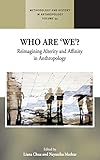Who are we?: reimagining alterity and affinity in anthropology/ edited by Liana Chua and Nayanika Mathur.
Contributor(s): Chua, Liana [editor.] | Mathur, Nayanika [editor.].
Publisher: Newyork: Bererghahn Books, 2018Description: viii, 251p.ISBN: 9781785338885 (hardback : alk. paper).Subject(s): Ethnology -- Case studies | Group identity -- Case studies | Ethnicity -- Case studies | Other (Philosophy) -- Case studiesDDC classification: 305.8 Summary: Who do “we” anthropologists think “we” are? And how do forms and notions of collective disciplinary identity shape the way we think, write, and do anthropology? This volume explores how the anthropological “we” has been construed, transformed, and deployed across history and the global anthropological landscape. Drawing together both reflections and ethnographic case studies, it interrogates the critical—yet poorly studied—roles played by myriad anthropological “we” ss in generating and influencing anthropological theory, method, and analysis. In the process, new spaces are opened for reimagining who “we” are – and what “we,” and indeed anthropology, could become.| Item type | Current location | Call number | Status | Date due | Barcode |
|---|---|---|---|---|---|
 Books
Books
|
NASSDOC Library | 305.8 WHO- (Browse shelf) | Available | 54195 |
Browsing NASSDOC Library Shelves Close shelf browser

|

|

|

|

|
No cover image available |

|
||
| 305.8 VER-; Identity and cultural diversity: what social psychology can teach us | 305.8 VER-S Social Psychology of Ethnic Identity | 305.8 VOG-M Mobilization and conflict in multiethnic states | 305.8 WHO- Who are we?: | 305.8 WIE-N Nation state by accident: the politicization of ethnic groups and the ethnicization of politics:Bosnia, India, Pakistan | 305.8001 BRO-; Theoretical ethnography | 305.8001 HAN- Handbook of critical and indigenous methodologies |
Includes bibliographical references and index.
Who do “we” anthropologists think “we” are? And how do forms and notions of collective disciplinary identity shape the way we think, write, and do anthropology? This volume explores how the anthropological “we” has been construed, transformed, and deployed across history and the global anthropological landscape. Drawing together both reflections and ethnographic case studies, it interrogates the critical—yet poorly studied—roles played by myriad anthropological “we” ss in generating and influencing anthropological theory, method, and analysis. In the process, new spaces are opened for reimagining who “we” are – and what “we,” and indeed anthropology, could become.


There are no comments for this item.